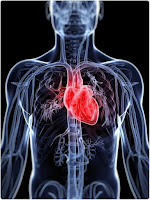 |
| Takotsubo Syndrome |
What is Takotsubo cardiomyopathy?
Takotsubo cardiomyopathy or "Broken Heart Syndrome" occurs when the heart muscles suddenly become numb or weak. It usually occurs after intense emotional or physical stress. This condition is temporary and most people recover within two months.
Death is rare, but heart failure occurs in about 20% of patients. Rarely reported complications include arrhythmias (abnormal heart rhythms), obstruction of blood flow from the left ventricle, and rupture of the ventricle wall.
Takotsubo syndrome is a sudden and severe form of heart failure. The symptoms may be similar to a heart attack. It is also known as Takotsubo Cardio Myopathy, Broken Heart Syndrome, Stress Cardio Myopathy, and Apical Ballooning.
Symptoms include high blood pressure, chest or abdominal pain, nausea, vomiting, diarrhea, constipation, paleness, weakness, and weight loss. In addition, some cases of cardiomyopathy, such as tachycardia, have been reported in people with pheochromocytoma.

.jpeg)










.jpg)


.jpeg)